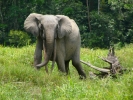 According to the Wildlife Conservation Society (WCS), 11,100 forest elephant were killed in Gabon's Minkebe Park. The slaughtering was probably done in the last five years by poachers involved in the ivory trade. Gabon's rain forests are home of over half of Africa's forest elephants, with a population estimated at over 40,000. The surveys were conducted by WCS, WWF, and Gabon's National Parks Agency (Agence Nationale des parcs Nationaux - ANPN). "This sad news from Gabon confirms that without a global commitment, great elephant populations will soon become a thing of the past," said Cristián Samper, of WCS. "We believe that elephants can still be saved, but only if nations greatly increase their efforts to stop poaching while eliminating the illegal ivory trade through better enforcement and reduced demand."
According to the Wildlife Conservation Society (WCS), 11,100 forest elephant were killed in Gabon's Minkebe Park. The slaughtering was probably done in the last five years by poachers involved in the ivory trade. Gabon's rain forests are home of over half of Africa's forest elephants, with a population estimated at over 40,000. The surveys were conducted by WCS, WWF, and Gabon's National Parks Agency (Agence Nationale des parcs Nationaux - ANPN). "This sad news from Gabon confirms that without a global commitment, great elephant populations will soon become a thing of the past," said Cristián Samper, of WCS. "We believe that elephants can still be saved, but only if nations greatly increase their efforts to stop poaching while eliminating the illegal ivory trade through better enforcement and reduced demand."
According to the Born Free Foundation, an estimated 31,800 elephant were lost to poaching last year in Africa. Gabon's elephant herds were believed to be less impacted by poaching than in other parts of Africa. In June 2011 however, a significant increase in human activity in the Minkebe National Park and its buffer zone was detected. A small camp of 300 artisanal gold miners had expanded to over 5,000 miners, poachers, and arms and drugs dealers. Park authorities estimated that 50-100 elephants were being killed daily as a result of increases in demand for ivory from the Far East and resulting price hike.
Gabon's National Park staff recently engaged in a firefight with armed poachers in Minkebe National Park after arresting two individuals carrying six tusks.
Lee White, head of the ANPN said: "Over the last three years we have deployed 400 additional parks staff, 120 soldiers and 30 gendarmes in our fight to stop illegal killing of elephants for the black market ivory trade. Despite our efforts we continue to lose elephants every day. If we do not turn the situation around quickly the future of the elephant in Africa is doomed. These new results illustrate starkly just how dramatic the situation has become. Our actions over the coming decade will determine whether these iconic species survive."


